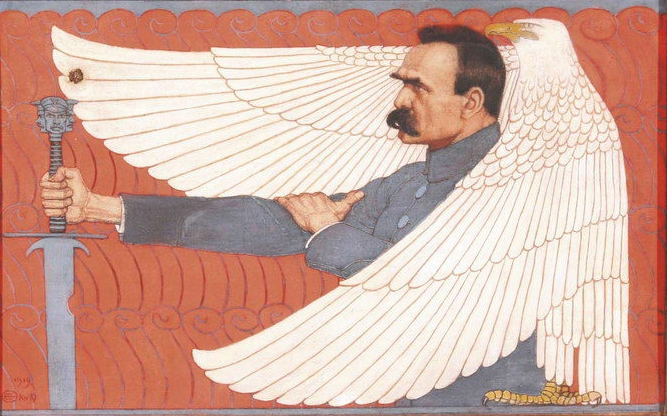By James Jackson
A timely and scrupulously researched new biography presents an important but neglected figure in modern European history, one whose legacy is especially relevant today.
“Without an independent Ukraine, there cannot be an independent Poland,” said Marshal Józef Piłsudski in 1919 – one of many observations from the founding father of Polish independence that remain relevant over a century later.
“We cannot believe anything Russia promises, for Russia promises when it is forced to do so and then goes back on its word from the moment its strength is renewed,” he added.
A year later, the marshal oversaw a famous military victory in the Battle of Warsaw, at which Polish forces turned back a Russian Bolshevik army advancing into Europe. He remained Poland’s dominant political figure until his death in 1935.
Piłsudski remains an iconic figure in Poland today, with various groups invoking his legacy and every school child recognising his distinctive moustache. Some have even suggested that the country’s current de facto leader, Jarosław Kaczyński – who, like Piłsudski, pulls the strings largely from behind the scenes – models his approach on the marshal’s.
Moreover, as well as being an important and relevant figure, Piłudski was also a fascinatingly complex – and often contradictory – one.
He fought for the establishment of democracy in Poland, but then himself undermined that democracy as an increasingly authoritarian leader. He was a revolutionary activist and underground newspaper publisher who ended up censoring and confiscating his former party’s publications.
He supported Ukrainian independence but seized Ukrainian lands. He inspired intense loyalty but did not show it to either of his wives.
Yet Piłsudski remains relatively little known outside of his homeland, something that a perfectly timed new biography of the marshal, Jozef Pilsudski: Founding Father of Modern Poland, by Joshua D. Zimmerman may help to address.
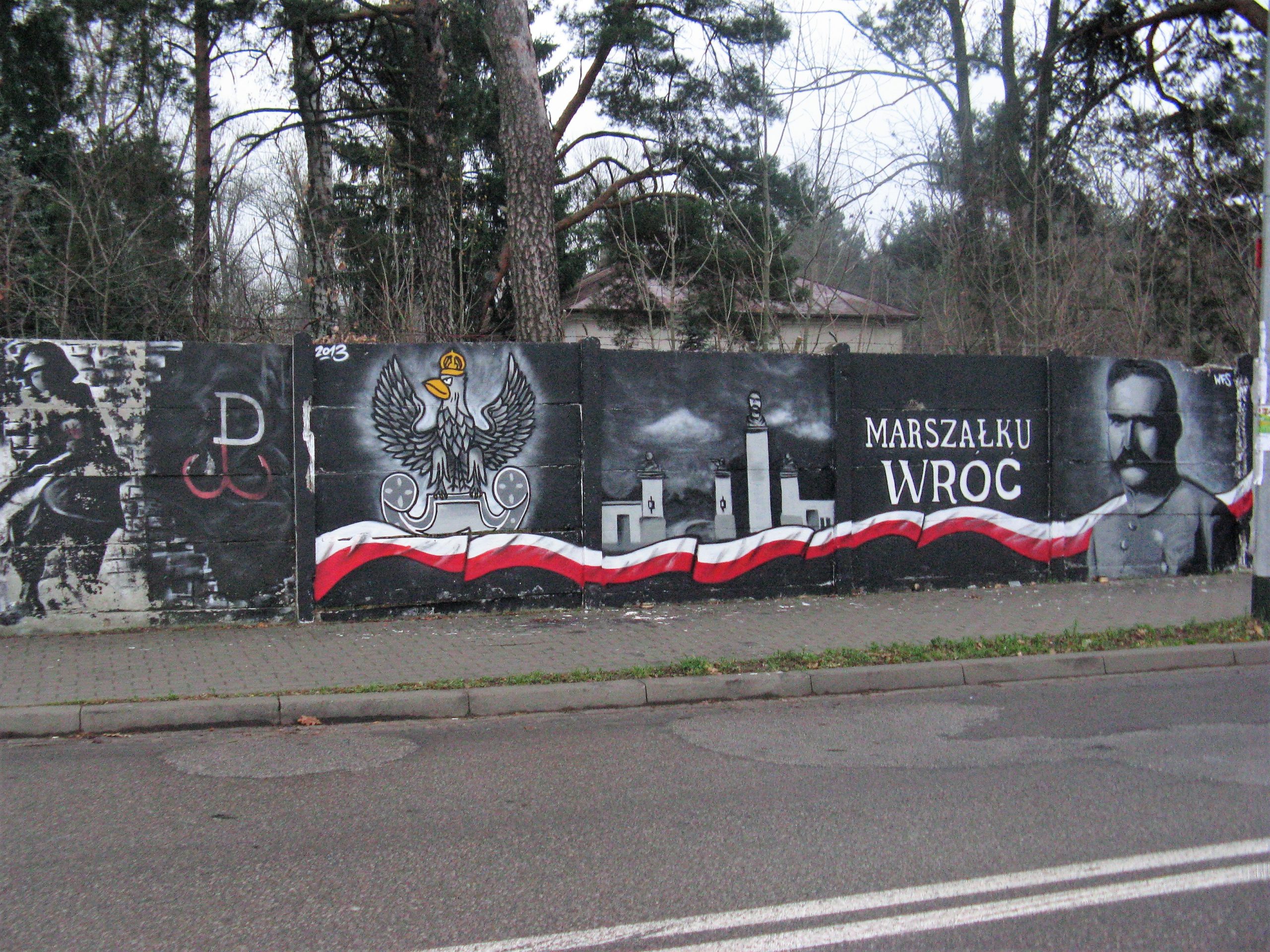
Mural of Piłsudski saying “Marshal, come back” on the walls of the National Defence Academy in Warsaw (Biedronki/Wikimedia Commons, under CC BY-SA 3.0)
Poland’s founding father
Born a nobleman in the Russian-controlled Kingdom of Poland, Piłsudski bristled against “the wildest lawlessness and oppression” of the occupied country he grew up in, where “the Polish language has been removed everywhere” and public inscriptions “are all written in a language [Russian] the majority of people do not know.”
Sent to Siberia for plotting to assassinate the tsar alongside Lenin’s brother while still a university student, Piłsudski became a socialist leader and was later jailed for a second time, feigning mental illness and working with an underground network of Poles to escape imprisonment in St Petersburg.
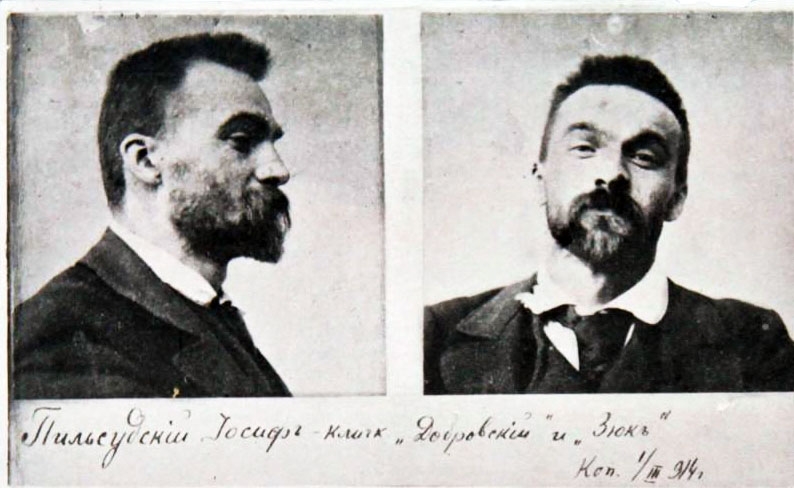
Mugshot of a 32-year-old Piłsudski made by the Russian secret police following his arrest in 1900 (Polish Army Museum/Wikimedia Commons)
He later set up a militia that would become the Polish Legions, entering the First World War allied with the Central Powers of Germany and Austria-Hungary, justified by “a deep feeling of hatred towards Russia, which had tormented my country in a manner so horrific”. The enemy of his enemy became his friend.
Piłsudski was an autodidact, a laser-sharp strategist who accurately predicted how the war would end before it even started, and chose to ally with the Central Powers “only because it aids me in these efforts” to set up a Polish state. He refused to allow his soldiers to fight against Western allies and was later imprisoned for a third time alongside many of his soldiers for refusing to swear an oath of loyalty to the Austrian emperor.
When, exactly as he predicted, the Entente won the war, he was released from jail and given a hero’s welcome in Warsaw, where he was made head of state.
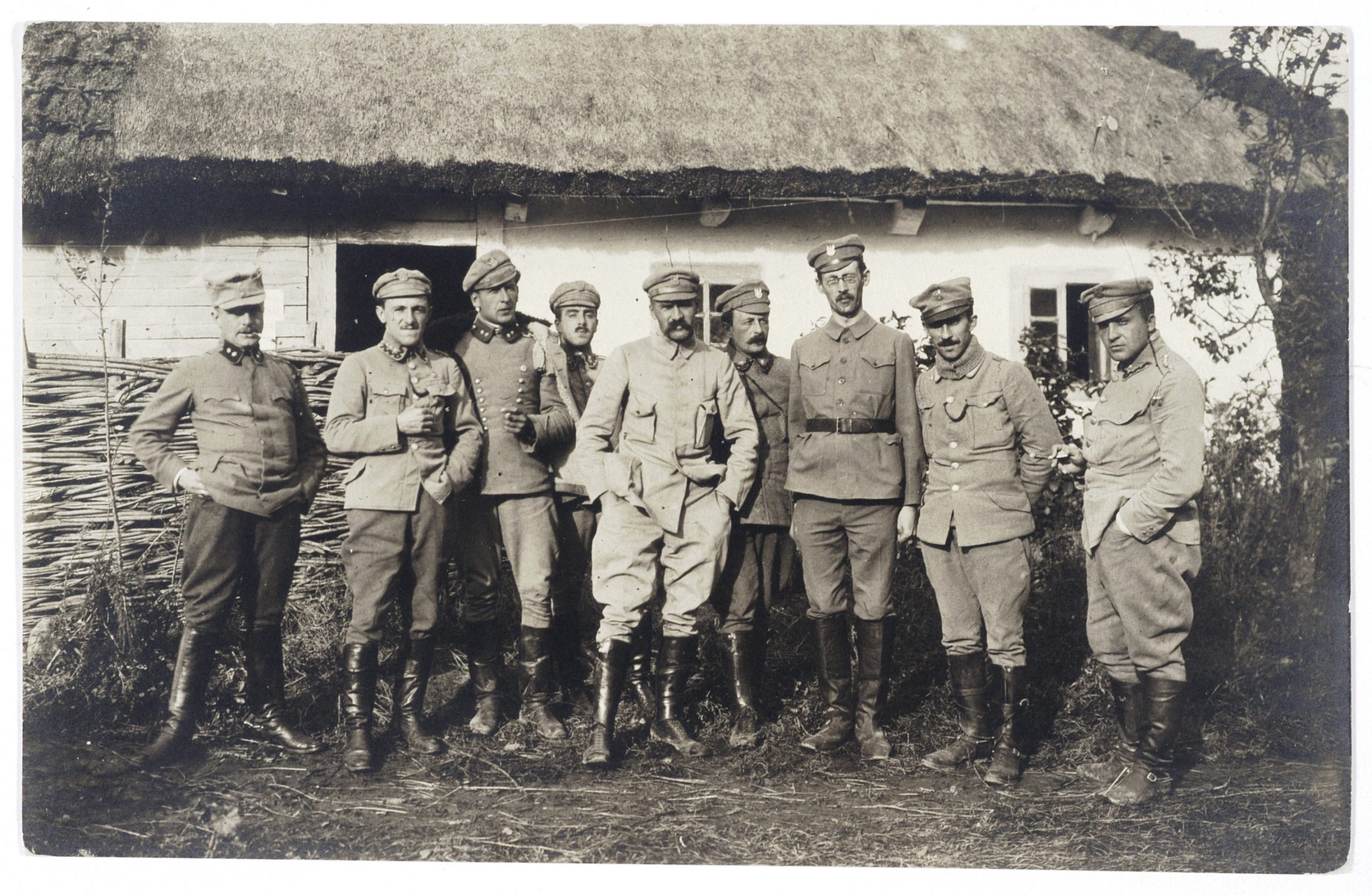
Piłsudski with officers of the Polish Legion’s I Brigade, around 1915-16 (National Library of Poland/Wikimedia Commons)
As the hero of a reborn state known for inspiring loyalty – one soldier saying after their first encounter, “I knew then that if this man called on me for any reason, I would follow him always and everywhere” – Piłsudski was the ”de facto dictator” of newly re-established Poland.
But he initially used his power to set up a parliamentary democracy, declaring that the Polish Sejm “will be the sole master and ruler of our country”.
After announcing his candidacy for the first democratic presidential election, he then withdrew from the race. His chosen disciple, Gabriel Narutowicz, was assassinated five days into office by a supporter of Piłsudski’s right-wing political rivals, the National Democrats, who saw the new president as too sympathetic towards Jews.
The turn against democracy
Zimmerman portrays this as a “watershed moment that changed Piłsudski forever”, with his disappointment at the public praise of the assassin by National Democrat media leading him to his later stance opposing Polish democracy. When a new coalition came to power in 1926, Piłsudski launched a coup with his loyal followers in the army, subsequently ruling as an authoritarian – but not totalitarian – until his death.
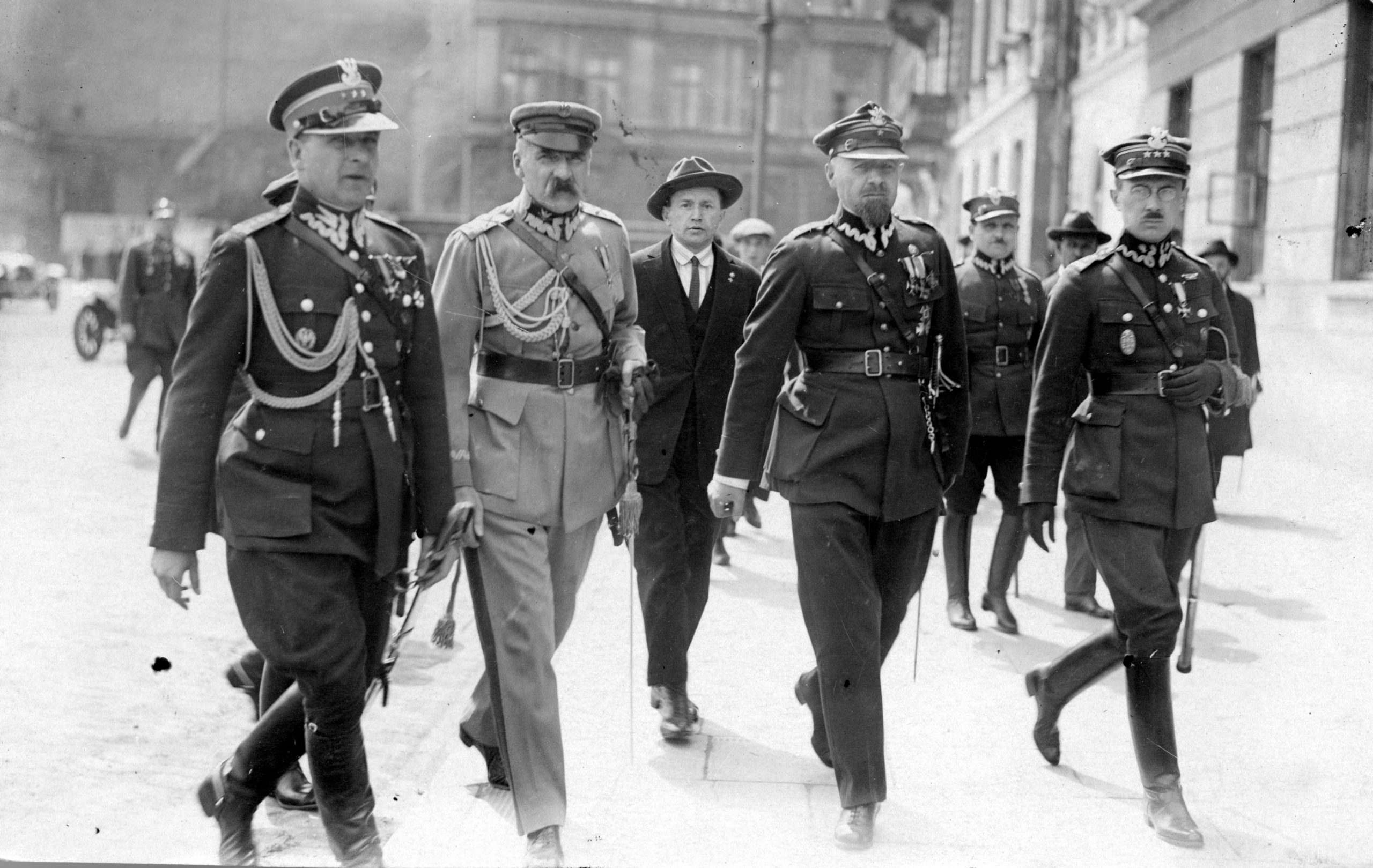
General Bolesław Wieniawa-Długoszowski, Józef Piłsudski, Aleksander Prystor and Wacław Stachiewicz in Warsaw, May 1926
Zimmerman points out that instances of censorship and political repression were “not the outcome of any shift in Pilsudski’s ideological beliefs in democratic institutions […] rather it was the result of the economic and political chaos that befell Poland”.
The author contextualises some of the crackdowns, noting that the centrist block was only repressed after it called for removing Piłsudski’s government by force, and that the notorious Bereza Kartuska internment camp was set up in 1934 after the assassination of the interior minister, with Pilsudski assenting to it only on the condition that it should last for a year (though in fact it did not actually close until 1939).
This even-handedness gives Piłsudski’s history a nuance that was not allowed by Poland’s post-WWII communist authorities, who portrayed him as a proto-fascist and cracked down on his legacy.
[Thread] As Poland's celebrates independence centenary, CBOS asked who are the greatest figures in its modern history.
Top 3: John Paul II (97% positive), Piłsudski (82%), Wyszyński (75%)
Bottom 3: Bierut (42% negative), Jaruzelski (42%), Gomułka (37%) https://t.co/aCbUvu3oq9— Notes from Poland 🇵🇱 (@notesfrompoland) August 5, 2018
Zimmerman’s book is impressively documented, making use of a wide range of contemporary sources. For such a politicised figure, whose history was suppressed in the communist era and who has been lionised in the democratic one, it is wise to stick to the documented facts, though this does mean that the biography is at times somewhat dry for a popular audience.
It is a shame, however, that some of the moustachioed marshal’s more colourful – but also revealing – quotes did not make it into the book, such as his famous: “[Poland is] a wonderful nation, but the people are fuckers”.
Another disadvantage of Zimmerman’s approach is that the ideas behind the politics are often ignored. We do not learn of Piłsudski’s theory of Prometheism and little of the Intermarium republic he wanted to establish between the Black, Adriatic and Baltic Seas (another idea that has relevance today, with Poland’s current authorities establishing the Three Seas Initiative that draws inspiration from the Intermarium).
"The war in #Ukraine is changing the power dynamic in #Europe. Going back to Józef Piłsudski’s Intermarium concept might make it possible for countries like #Poland to challenge the current Franco-German hegemony within the EU." Article by Simon Jyrkäs. https://t.co/f49BTmB9tO
— Lossi 36 (@36_lossi) May 24, 2022
We are also left wondering whether to agree with Piłsudski’s great rival Roman Dmowski that the marshal “merely used socialism for patriotic ends”. Another famous quote – often attributed to Piłsudski himself but probably originating elsewhere – says that he “took the red tram of socialism to the stop [called] ‘Independence’, but got off there”.
The chief difference between the left and right in Zimmerman’s book appears to be how Jews and other minorities would be treated in an independent Poland.
While clearly this was an important and divisive issue, we are left none the wiser as to whether Piłsudski actually supported a socialist economy or the redistribution of wealth and ownership. The erstwhile socialist revolutionary’s later deals with landowners in the east could show a pragmatism or a lack of principle, depending on your interpretation.
In his own words, Piłsudski seemed always willing to do whatever it took for what he thought was Poland’s benefit, but this invariably meant giving him more authority, whether in government or the military. A political wheeler-dealer, he broke multiple times with his own party and various national councils to this end, often threatening to resign and using his indispensability as a leader and command of loyal troops as leverage to achieve his goals.
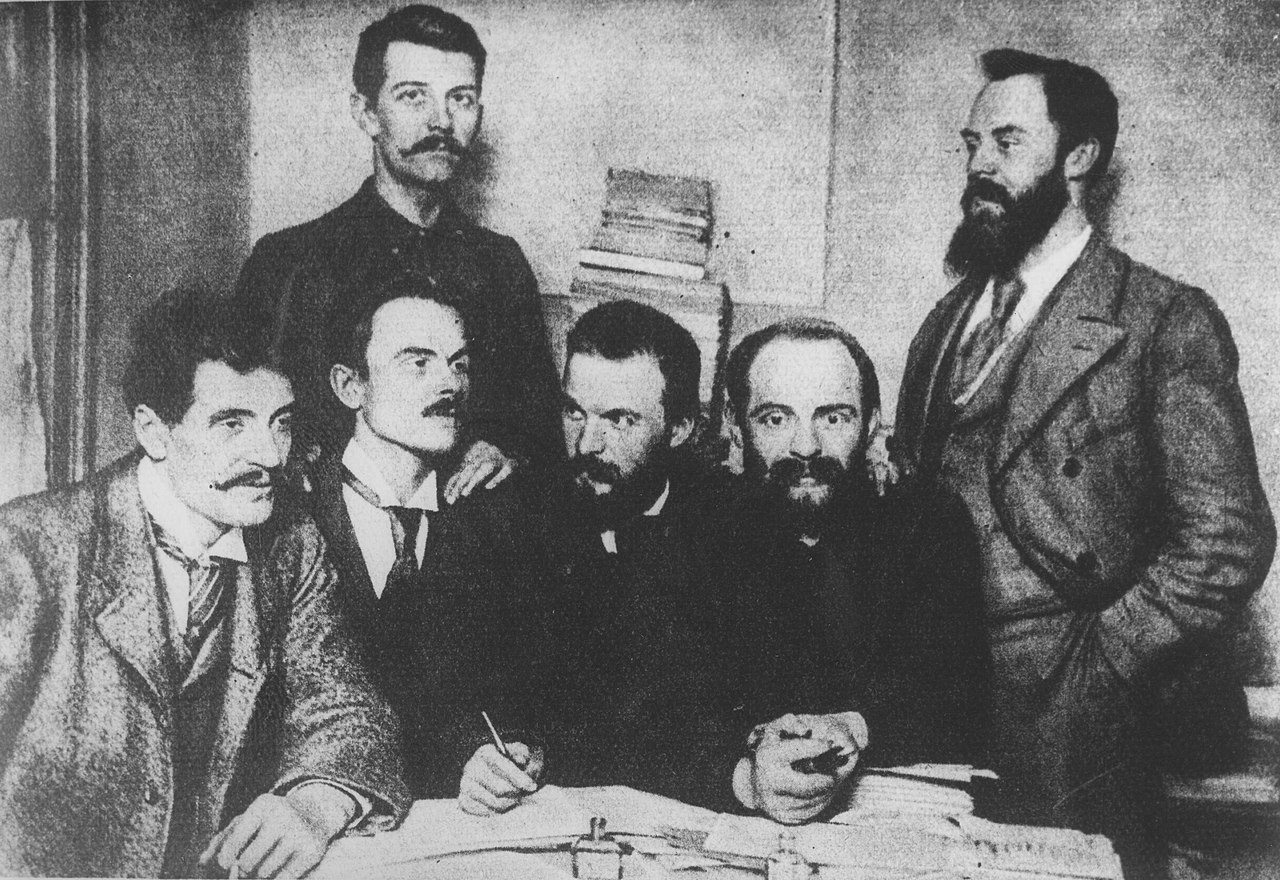
Piłsudski (seated centre) in a delegation of the Polish Socialist Party at the congress of the Second International in London, 1896 (National Digital Archives/Wikimedia Commons)
Confronting threats from east and west
Apart from his decades of planning for how to secure Polish independence by making its army invaluable to potential allies in a war, with both sides promising to establish a Poland (at least in name), it was his stopping of the Red Army in its assault on Warsaw in 1920 with a military victory known as the “Miracle on the Vistula” that most impressed contemporaries on the world stage.
With the Bolsheviks seeing Poland as a stepping stone on the path towards advancing further west, this astounding military victory may well have changed world history. Poland under Piłsudski later gained support from the West by promising to be a bulwark against Bolshevism, though Piłsudski also refused to join in the Russian civil war alongside the West and support the hated “old Russia,” in the form of the tsarist White Army.
Piłsudski’s thinking on Russia and eastern European security remains remarkably relevant today. He was a defender of Ukrainian independence as a buffer against Russian expansionism, though his seizure of Eastern Galicia and later march on Kyiv made him an enemy of Ukrainian nationalists, who tried to assassinate him.
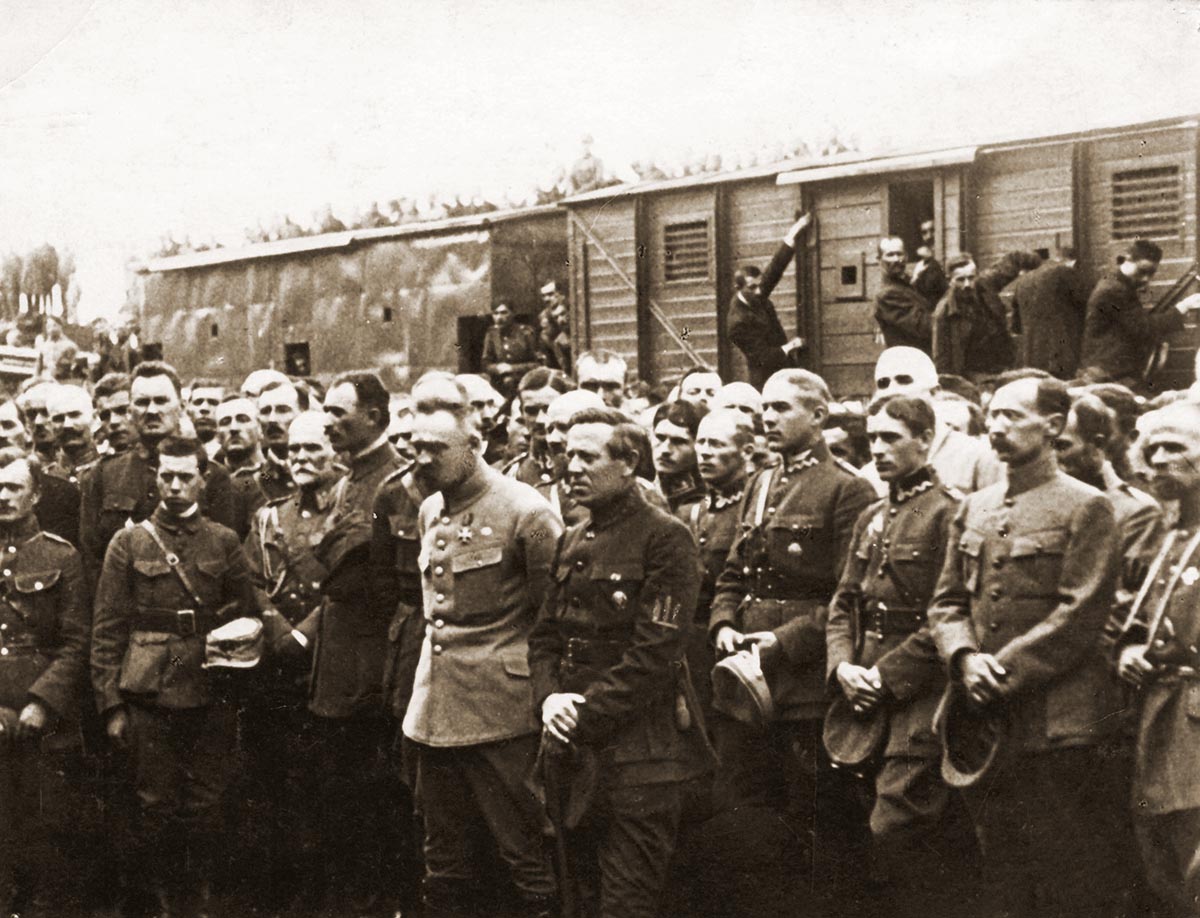
Piłsudski with Symon Petliura, president of the Ukrainian People’s Republic, and Polish and Ukrainian officers, September 1920
Piłsudski spent the final years of his Sanacja (healing) regime in the 1930s desperately planning how to help Poland survive a revanchist Nazi Germany and expansionist Soviet Union.
Though he negotiated nonaggression pacts with both the neighbouring powers, he was rightly cynical about whether they would last. He is described in one memorable scene in the book as collapsing in tears into his playing cards, sobbing that Poland would be lost within the decade – a prediction that was tragically proven right.
He considered launching a preventative war against Hitler, and he won concessions against still-demilitarised Germany in Gdańsk by flexing military muscle, but was unable to do much without the support of ally France.
Ultimately, Piłsudski’s life was that of a classical hero, replete with both hubris and tragedy. Perhaps the greatest tragedy of all was that this adept strategist saw the downfall of Poland coming but did not trust the ability of anyone other than himself to stop it, leaving Poland rudderless without a trusted and trained successor after his death.
Main image credit: Edward Okuń/Wikimedia Commons (under public domain)

is a British freelance journalist based in Berlin. Alongside news and politics, he also writes about culture and can be followed on Twitter @derJamesJackson.
